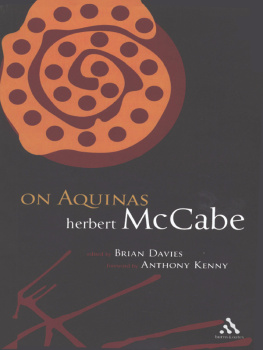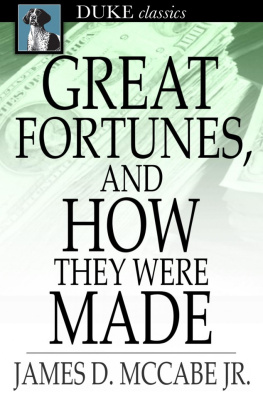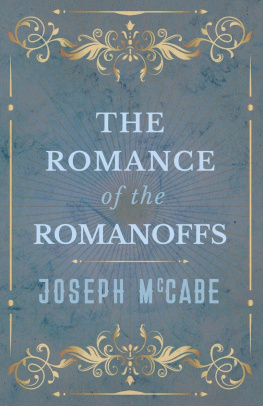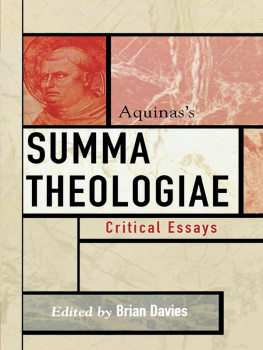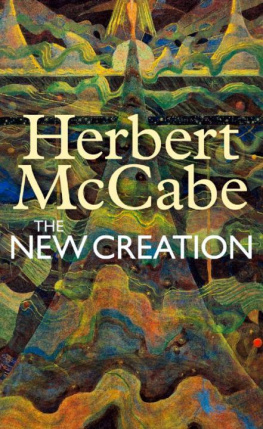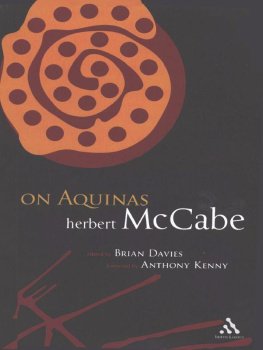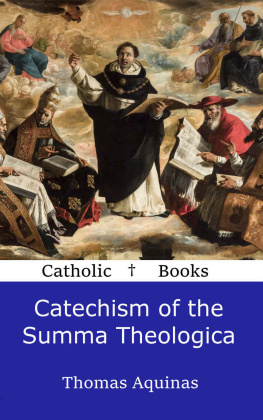Mccabe Herbert - On Aquinas
Here you can read online Mccabe Herbert - On Aquinas full text of the book (entire story) in english for free. Download pdf and epub, get meaning, cover and reviews about this ebook. year: 2011, publisher: Bloomsbury Publishing Plc, genre: Religion. Description of the work, (preface) as well as reviews are available. Best literature library LitArk.com created for fans of good reading and offers a wide selection of genres:
Romance novel
Science fiction
Adventure
Detective
Science
History
Home and family
Prose
Art
Politics
Computer
Non-fiction
Religion
Business
Children
Humor
Choose a favorite category and find really read worthwhile books. Enjoy immersion in the world of imagination, feel the emotions of the characters or learn something new for yourself, make an fascinating discovery.
- Book:On Aquinas
- Author:
- Publisher:Bloomsbury Publishing Plc
- Genre:
- Year:2011
- Rating:4 / 5
- Favourites:Add to favourites
- Your mark:
- 80
- 1
- 2
- 3
- 4
- 5
On Aquinas: summary, description and annotation
We offer to read an annotation, description, summary or preface (depends on what the author of the book "On Aquinas" wrote himself). If you haven't found the necessary information about the book — write in the comments, we will try to find it.
On Aquinas — read online for free the complete book (whole text) full work
Below is the text of the book, divided by pages. System saving the place of the last page read, allows you to conveniently read the book "On Aquinas" online for free, without having to search again every time where you left off. Put a bookmark, and you can go to the page where you finished reading at any time.
Font size:
Interval:
Bookmark:
by Brian Davies OP

Published by Burns & Oates
A Continuum imprint
| The Tower Building | 80 Maiden Lane |
| 11 York Road | Suite 704, |
| London SE1 7NX | New York NY 10038 |
www.continuumbooks.com
Copyright The Estate of Herbert McCabe OP, 2008
All rights reserved. No part of this publication may be reproduced or transmitted in any form or by any means, electronic or mechanical, including photocopying, recording or any information storage or retrieval system, without prior permission from the publishers.
First published 2008
Reprinted 2010
British Library Cataloguing-in-Publication Data
A catalogue record for this book is available from the British Library.
ISBN-13 9780860124610 (paperback)
Herbert McCabe was one of the most talented English-speaking phildsophers of the twentieth century. Had he chosen to pursue a conventional academic career as a philosopher -something that his friends find hard to imagine he would quickly have risen to the top of the profession. But instead he lived the life of a Dominican friar, and so his philosophical insights were not widely shared outside the circle of his religious brethren. It is very good that now, after his death, they are being made available to a wider public.
The lectures presented in this volume were delivered as an introduction to the thought of St Thomas Aquinas. But they present a highly personal interpretation of the Saint, and contain many original and unexpected developments of his ideas.
In the English speaking world it is possible to identify four schools among contemporary admirers of Aquinas.
First, there are the conservatives who continue to work in the neo-scholastic tradition of Gilson and Maritain, albeit in a chastened and less triumphalist form. A doughty exponent of this school of thought is Ralph Mclnerny, who has sought to make Thomism accessible in many works.
Second, there are the transcendental Thomists who combine close and sympathetic appreciation of the writings of St Thomas with a respect for the importance of the critical insights of Immanuel Kant. Prominent leaders of this line of thought were the Jesuits Joseph Marechal and Peter Hoenen, and at the present time the school is represented above all by followers of the late Bernard Lonergan S J .
Third, there are those who follow an agenda drawn from post-modernism, among whom are the members of the theological movement that styles itself Radical Orthodoxy. John Milbank and Catherine Pickstock are vociferous proponents of this tendency, which has gained influence in the Church of England.
Finally, there are several philosophers in the analytic tradition, who seek to interpret Aquinas in the light of recent currents of thought in philosophy of language and philosophy of mind. Many of these have been heavily influenced by Wittgenstein, who like Aquinas stands at the opposite pole of philosophy from the Cartesian tradition which sees epistemology as the basic philosophical discipline and private consciousness as the fundamental datum of epistemology. There is by now an impressive corpus of works of this so-called analytical Thomism. Some of the leading practitioners are Catholics, such as Peter Geach and John Finnis; but there have been other influential writers of this school who like Norman Kretzmann have never been Catholics or like Alasdair Mclntyre have held varying religious allegiance.
Herbert McCabe was often identified as a member of this school an analytical Thomist. But he hated being called a Thomist of any kind, and his own spoken and written presentations of the Saints teaching always bore a highly personal mark. He was indeed an admirer of Wittgenstein, and he sought to graft the insights of the twentieth-century thinker on to those of the thirteenth-century thinker not out of a desire to appear up to date he showed no inclination to endorse any of the trendy intellectual fashions of the age but because he recognized a genuine affinity between the two masters.
Undoubtedly, Aquinas and Wittgenstein shared a conviction that it is through an unconstrained attention to the operation of language that we achieve philosophical understanding. But McCabes Aquinas is, as he admits, in a sense more linguistic than the historical Aquinas was. Whereas Aquinas himself undoubtedly believed that every thought we have can, in principle, be expressed in language, he did not, McCabe says, fully grasp that human thought just is the capacity to use language. We analyse understanding and thinking in terms of human communication, whereas Aquinas analyses communication in terms of understanding and thinking.
The present book concentrates on Aquinas philosophical anthropology on the nature of animal and hssuman life, on the relation between the senses and the intellect, and on the virtues that are essential to human flourishing. While McCabe makes copious use of the Aristotelian metaphysical structures that Aquinas employs, he writes in an admirably informal manner far removed from the style of the crabbed textbooks of seminary Thomism. He is more generous than Aquinas was in providing concrete examples to illustrate conceptual points, and his examples are always fresh and vivid, and are commonly convincing. They are also often surprising, as when he lists Brunei, Dictionary Murray, Lenin, and Bob Geldof as examples of the virtue of magnanimitas.
Though the book will appeal especially to those who are already aware of the abiding value of Aquinas insights, it could serve very well as a general introduction to the philosophy of human nature. The book is not a treatise about Aquinas, it is an exercise in philosophy with Aquinas.
Since his death in 2001 it has been my privilege to edit and prepare for publication a substantial amtmnt of unpublished material left behind by Herbert McCabe OP. Readers, therefore, now have available (all under an imprint of Continuum) God Still Matters (2002), God, Christ and Us (2003), The Good Life (2005), and Faith Within Reason (2007). These volumes, which have received extremely favourable reviews, provide a vivid sense of McCabes personality and cast of mind. They illustrate how deep Christian sensibility can be combined with rigorous philosophical argument. They show us how it is indeed possible skilfully to display what St Anselm of Canterbury famously referred to as faith seeking understanding.
One reason they do so lies in the fact that McCabe was very much a student and defender of Thomas Aquinas. It would be wrong to say that McCabe was a Thomist since, with good reason, he took Thomism to be a relatively recent phenomenon, one often at odds with what Aquinas himself had to say. Aquinas, McCabe frequently asserted, was not himself a Thomist. Yet McCabe was always fascinated by things that Aquinas wrote, and the influence of Aquinas is to be seen everywhere in his writings. Arguably, Aquinas is the most distinguished example of a Christian author pursuing the path of faith seeking understanding, which is why McCabes serious philosophy in the service of theology, a collection of texts in which central Christian themes are thought through and engaged with as items which ought to be of interest to everyone.
Yet McCabe never published a book on Aquinas. He occasionally wrote about Aquinas, and he lectured on Aquinass thought for several decades. But he never gave us a full-scale study of Aquinas, and I have always lamented this fact. In recent years there has been an astonishing revival of interest in Aquinas, and McCabe undoubtedly had the ability to forward this along at book length. Had he settled down to writing a volume on Aquinas, the result, I think, would have been recognized as one of the most distinguished in the field. One of McCabes great talents when it comes to Aquinas was an ability to present the latters thinking freshly, as important and as coming from an intelligent contemporary. Book-length studies of Aquinas often fail to do this. All too often they seem not to grasp where Aquinass genius lies. Frequently, they provide detailed and plodding accounts of*what Aquinas said but fail to engage with it critically or to make illuminating connections between the thought of Aquinas and that of later writers. Frequently, also, they do not give us a sense of why Aquinas might be exciting to read for oneself. A book on Aquinas from McCabe, I am certain, would not have had these deficiencies.
Font size:
Interval:
Bookmark:
Similar books «On Aquinas»
Look at similar books to On Aquinas. We have selected literature similar in name and meaning in the hope of providing readers with more options to find new, interesting, not yet read works.
Discussion, reviews of the book On Aquinas and just readers' own opinions. Leave your comments, write what you think about the work, its meaning or the main characters. Specify what exactly you liked and what you didn't like, and why you think so.

